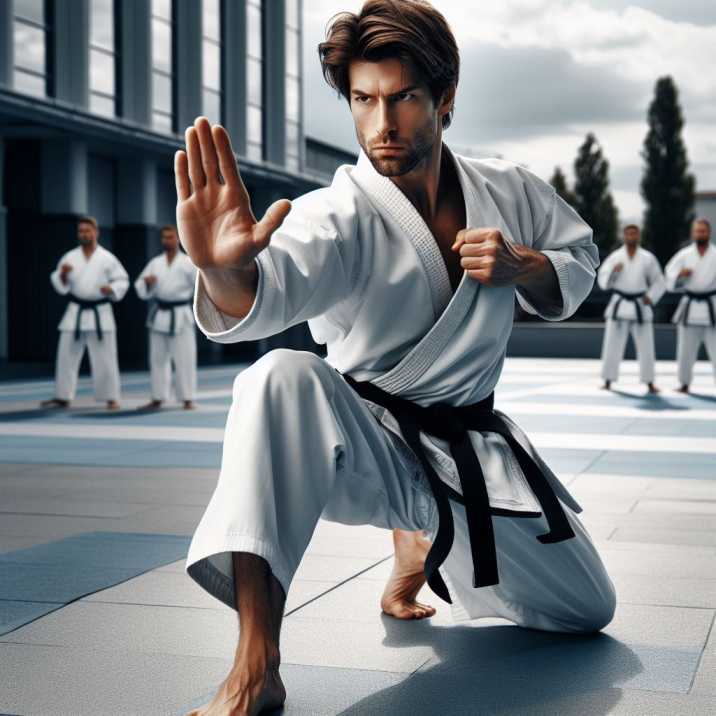Introduction:
Table of Contents
Is Kenpo Karate effective? This age-old question has intrigued martial arts enthusiasts for decades. As a traditional martial art with roots tracing back to ancient China and Japan, it has garnered both praise and skepticism. In this comprehensive guide, we will delve into various aspects of Kenpo Karate’s effectiveness, exploring its self-defense capabilities, fitness benefits, and more.

History and Origins of Kenpo Karate
Kenpo Karate traces its roots back to China, where it was originally known as Chuan Fa or Kung Fu. It later evolved in Japan, where it gained the name Kenpo. The martial art found its way to the United States through the efforts of Grandmaster Ed Parker in the 20th century. Today, this is practiced worldwide, blending elements of Chinese martial arts with Japanese techniques.
Principles and Techniques
At the heart of Kenpo Karate lie principles such as efficiency of movement, rapid-fire strikes, and adaptability. Practitioners focus on close-range combat, utilizing a variety of strikes, kicks, blocks, and joint locks. it emphasizes fluidity and speed, enabling practitioners to swiftly incapacitate opponents in self-defense scenarios.
Self-Defense Applications
Kenpo Karate is renowned for its practicality in self-defense scenarios. Its techniques are designed to neutralize threats quickly and efficiently, making it suitable for real-world confrontations. From deflecting strikes to executing counterattacks, Kenpo Karate equips practitioners with the skills needed to defend themselves effectively in various situations.
Fitness Benefits
Beyond self-defense, Kenpo Karate offers a myriad of fitness benefits. The martial art provides a full-body workout, enhancing strength, flexibility, and cardiovascular endurance. Moreover, the mental discipline required in Kenpo Karate fosters focus, concentration, and stress relief. Practicing Kenpo Karate not only improves physical fitness but also promotes overall well-being.
Effectiveness in Combat Sports
While Kenpo Karate primarily focuses on self-defense, some practitioners participate in competitive combat sports such as MMA (Mixed Martial Arts) or kickboxing. Kenpo Karate’s adaptability and striking techniques can be advantageous in these arenas. However, its effectiveness may vary depending on the ruleset and opponent, as competitive sports often require specialized training beyond traditional martial arts.
Training and Progression
Training is structured and progressive, with practitioners advancing through belt ranks as they master techniques and principles. Classes typically include warm-ups, drills, forms (kata), and sparring (kumite). The belt system provides a clear path for progression, motivating practitioners to strive for improvement and mastery of the martial art.
Real-Life Success Stories
Throughout history, numerous individuals have credited Kenpo Karate with saving their lives in real-life situations. From thwarting muggers to defending against multiple attackers, these anecdotes highlight the practical effectiveness of the martial art. These success stories serve as testimonials to Kenpo Karate’s efficacy in self-defense.
Debunking Common Myths
Despite its proven effectiveness, Kenpo Karate often faces misconceptions and myths propagated by skeptics. These may include doubts about its practicality in modern self-defense scenarios or criticisms of its traditional roots. By debunking these myths, we can gain a clearer understanding of Kenpo Karate’s true capabilities.
A table of information highlighting key aspects
| Aspect | Description |
|---|---|
| Origin | Traces back to ancient China (Chuan Fa/Kung Fu) and evolved in Japan (Kenpo) before spreading to the United States. |
| Principles | Efficiency of movement, rapid-fire strikes, adaptability, and fluidity. |
| Techniques | Strikes, kicks, blocks, joint locks, and close-range combat techniques. |
| Self-Defense | Practical applications in real-world scenarios, emphasizing neutralization of threats through deflection and counterattacks. |
| Fitness Benefits | Full-body workout enhancing strength, flexibility, and cardiovascular endurance. Mental discipline promotes focus and stress relief. |
| Training Regimen | Structured classes including warm-ups, drills, forms (kata), and sparring (kumite). Progression through belt ranks as mastery is achieved. |
| Competitive Performance | Adaptable techniques may be advantageous in combat sports like MMA or kickboxing. Effectiveness varies based on ruleset and opponent. |
| Real-Life Success | Numerous anecdotes highlight Kenpo Karate’s effectiveness in self-defense situations, including thwarting muggers and defending against multiple attackers. |
| Myths Debunked | Addressing misconceptions surrounding practicality in modern scenarios and criticisms of traditional roots. |
| Conclusion | A rewarding journey of growth and empowerment, combining practical self-defense applications, fitness benefits, and a rich historical lineage. |
This table provides a concise overview of key aspects related to the effectiveness, covering its origins, principles, techniques, self-defense applications, fitness benefits, training regimen, competitive performance, real-life success stories, myths debunked, and a concluding summary.
Conclusion
In conclusion, With its practical self-defense applications, fitness benefits, and rich history, it remains a formidable martial art in today’s world. Whether you’re seeking to enhance your self-defense skills or improve your overall fitness, Kenpo Karate offers a rewarding journey of growth and empowerment.
FAQs
Is Kenpo Karate suitable for beginners?
Absolutely! it is suitable for beginners of all ages and fitness levels. Classes are typically structured to accommodate newcomers, gradually introducing foundational techniques and principles. Instructors focus on providing personalized guidance and support to help beginners develop confidence and proficiency in the martial art.
2. How long does it take to progress through belt ranks in Kenpo Karate?
The time it takes to progress through belt ranks in Kenpo Karate varies depending on several factors, including the individual’s dedication, frequency of training, and the specific requirements of their martial arts school. On average, it may take several years to advance from beginner (white belt) to black belt level. However, the journey is more about personal growth and mastery than simply achieving belt ranks.
3. Can children learn Kenpo Karate?
Yes, children can learn! Many martial arts schools offer specialized classes for children, focusing on age-appropriate techniques, safety, and character development. Kenpo Karate can be highly beneficial for children, promoting physical fitness, discipline, respect, and self-confidence. It’s a great way for kids to develop essential life skills while having fun and staying active.


